“I’ll be myself and see how we go”: Labor’s search for authenticity
At 37, Peter Malinauskas this week became only the second Labor leader in South Australia since Mike Rann took over a quarter of a century ago. He talks to Tom Richardson about renewal, reform and his determination to be an “authentic” political voice.
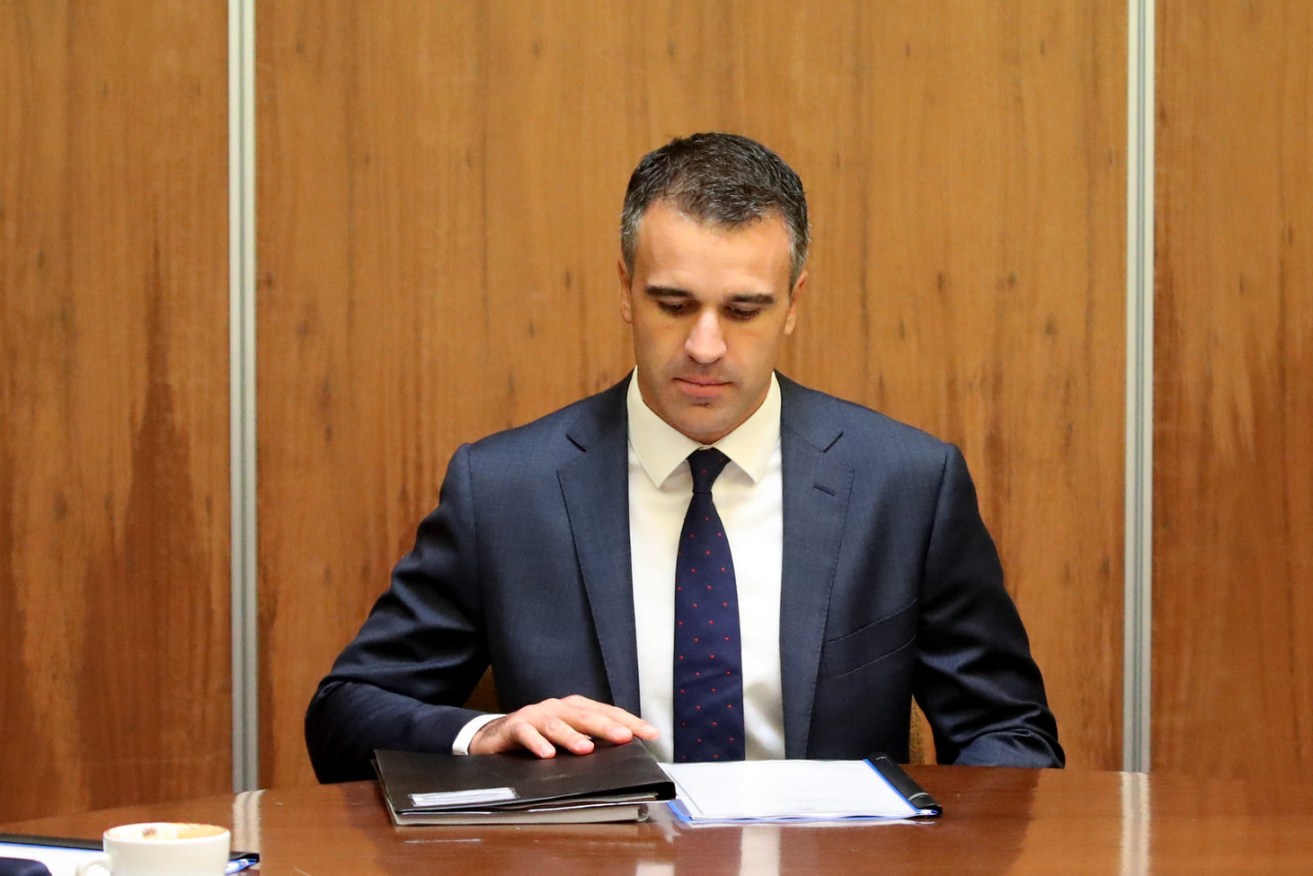
Peter Malinauskas chairs a caucus meeting this week. Photo: Kelly Barnes / AAP
Sitting in the Hawker Street Café in his new seat of Croydon, sipping an early morning skim flat white, Peter Malinauskas reflects on a whirlwind two years.
He first entered parliament’s Upper House in December 2015. Next month he’ll formally enter the House of Assembly for the first time – as leader of the Labor Party.
If his meteoric political rise appeared preordained, he insists there was plenty of advice to the contrary.
“When the Premier [Jay Weatherill] rang me up in 2015 and asked me to come into state parliament, there were people telling me ‘oh don’t do that, it’s crazy’,” he recalls.
The Holden closure was imminent, while doubts still surrounded the future submarine project, and “people were predicting unemployment to shoot to 10 per cent”.
“Friends thinking they were looking out for my interest were saying to me, ‘why would you go into state politics now?’ SA Labor is going to get wiped out’.
“But my view was: that’s exactly when you should be getting in, when you can contribute something.”
Within a month of entering parliament, Malinauskas was elevated to cabinet. He says he half expected, with access to Treasury forecasts, that he’d “look under the bonnet” and discover the South Australian jalopy was headed for the scrapyard.
“All I saw was the opposite,” he insists.
“I think there’s a lot of good signs in terms of where we are economically… nobody was predicting we’d be in the economic position we are now three years ago.”
The 37-year-old insists “I don’t think we’re out of the woods… but I think there’s a lot of green shoots starting to come through… some pretty good signs around the place that things are looking up”.
It’s not a bad political line, given it won’t be his Labor Government reaping the benefits of the growing green shoots – and Malinauskas is clearly keen to establish a narrative around Labor’s economic legacy.
“What Labor did in terms of investments in particular sectors of the economy is paying huge dividends,” he says, citing tourism, new manufacturing and renewables.
Politically, what the party did in terms of its own renewal is paying dividends too, with an influx of new blood reflected in a new-look frontbench under a leadership team – Malinauskas and left-winger Susan Close – that was not even in parliament when Weatherill took over as Premier.
“It’s very unusual – and this isn’t through luck, this is through astute decision-making – to have a government lose after 16 years and have a bunch of new people coming in,” Malinauskas notes.
“Even our biggest critics would acknowledge we’ve done renewal pretty well.”
Labor’s task now is policy renewal – a task Malinauskas talks about in terms of “the values I want to underpin our policy formulation”.
“I’m not sitting around planning out return to government before we work out what people were telling us at the election,” he says.
It’s a process, he argues, that won’t revolve around “an epiphany about a single core issue”, but hard graft – consultation, reflection, listening to the voters that finally turfed his party out of office – though not overwhelmingly.
What will the policy debate look like in four years’ time, when Malinauskas hopes to lead Labor back into government?
“Let’s wait and see – who knows,” he says.
“Let’s go and find out.”
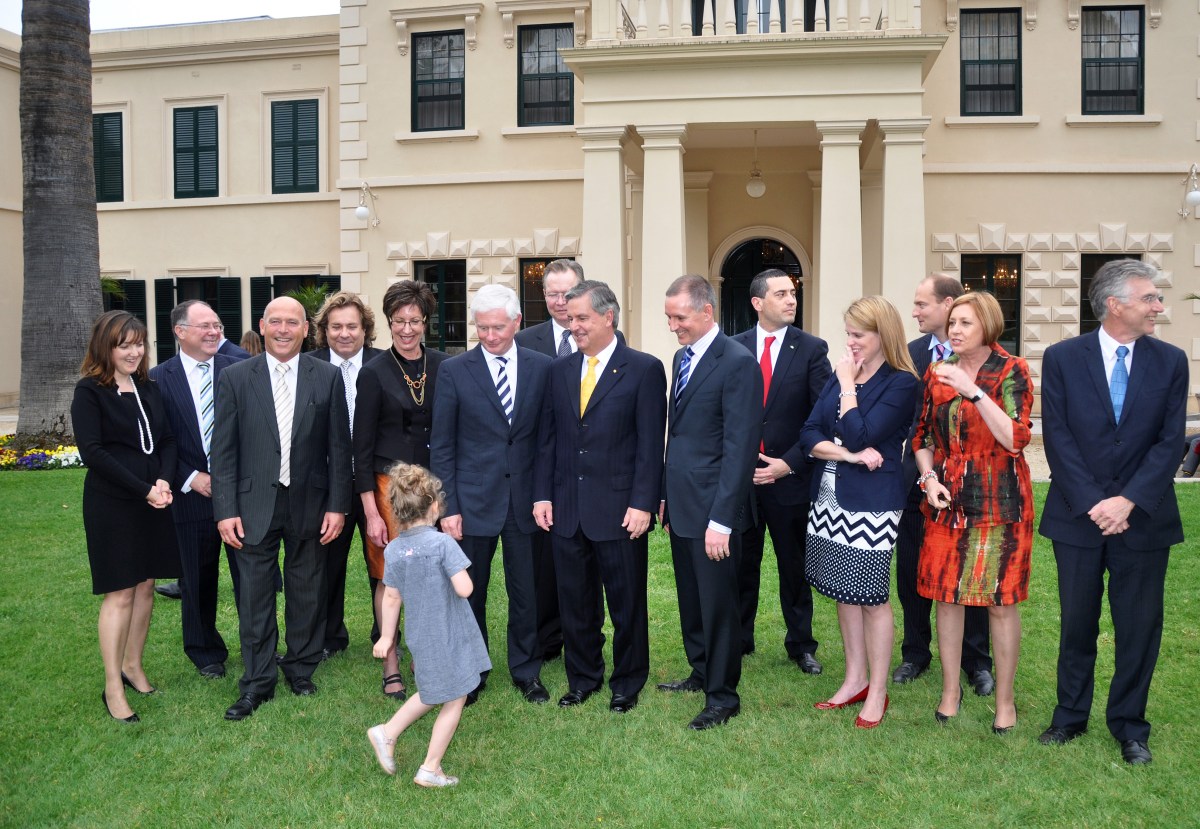
Members of Jay Weatherill’s first cabinet join him outside Government House after his installation as Premier in 2011 – only Tom Koutsantonis remains on Labor’s frontbench. Photo: Tim Dornin / AAP
“You’ve always got to be listening, and that’s particularly true when you’ve just lost an election,” Malinauskas says.
“Opposition provides a way to do that – what we’ve got to do is make sure we’re doing it in a way that’s in concert with our values [and] have an eye to how that feels with the broad value set.”
Malinauskas, long the convenor of the ALP’s dominant Right faction, Labor Unity, says he sees himself as “a centre-left politician”, and one who prioritises “outcomes versus everything else”.
“For me, that motivation is why I’m in elected office in the first place,” he says.
He cites social justice as the aspiration of the Labor movement, but thus far this week he has elaborated on this by referencing issues of economic equality and opportunity, safeguarding and maximising people’s standard of living and ensuring that a prosperous society doesn’t leave people behind.
I think nuclear power on balance is not a bad thing
“I believe in markets – the power of markets – but I believe they’re not infallible,” he says.
“And that’s where the government’s got a role to play.”
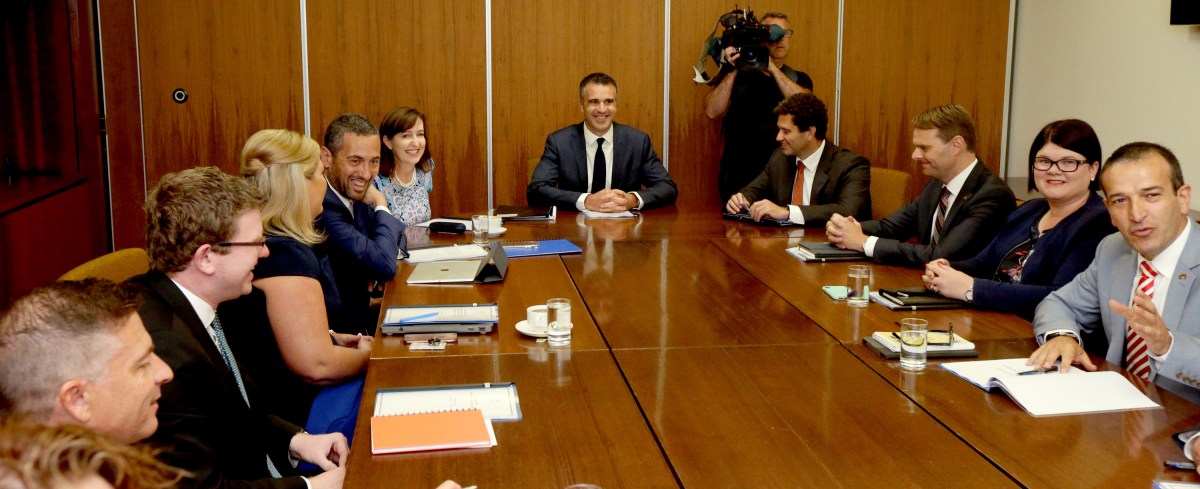
NEW FACES: Malinauskas and some of his new team. Photo: Kelly Barnes / AAP
His narrative is less clear on his own social views.
“People tend to characterise someone as either socially conservative or socially liberal,” he muses.
“I wouldn’t characterise myself as either… I look at issues on their merits, and form a view.”
He says he voted ‘yes’ on same-sex marriage “but I voted very strongly against total legalisation of prostitution”.
“So work that out,” he shrugs.
Like many MPs, he is unconvinced on euthanasia – but open to being persuaded.
“Euthanasia is an interesting one,” says the former Health Minister.
“My position is I’m concerned about anything that undermines the imperative of maximising the care people get, and if there are things that could undermine that principle it would concern me… there may be a version of the bill that I’d consider, but my predisposition is to not undermine that principle.”
Malinauskas believes that “it says something about humanity in a prosperous nation like ours that we do everything we can to keep people alive”.
“I think there’s something profound in that,” he says.
“It says a lot about who we are as a society that we put a high value on [life].”
Despite Labor’s largely-abandoned bid to rein in recurrent health spending via Transforming Health, the portfolio continues to consume a bigger percentage of the state budget year on year – a fact Malinauskas believes taxpayers accept.
“If you speak to taxpayers about how much of their taxpayer dollars go towards Health they’re almost always very comfortable – I think that says something about who we are that I like,” he notes.
“At the same time,” he adds quickly, “while these questions are fundamental and important, they’re not what motivated me to join the Labor Party.”
It’s an interesting admission, and one he acknowledges has echoes of former Opposition Leader – now Premier – Steven Marshall’s infamous admission during the 2014 election campaign that he “didn’t go into politics for the social issues” – albeit perhaps phrased more delicately.
“I think when you get elected to office you have a responsibility to consider these questions on their merits, weigh these things up and make an informed judgement,” he continues.
“To say I’m not interested in these things almost says you’re dismissive of them – and I’m not.”
His party pushed plenty of social policy across his Upper House desk in government that contained “questions of this nature”, and he insists he always “spent a lot of time and effort” considering them.
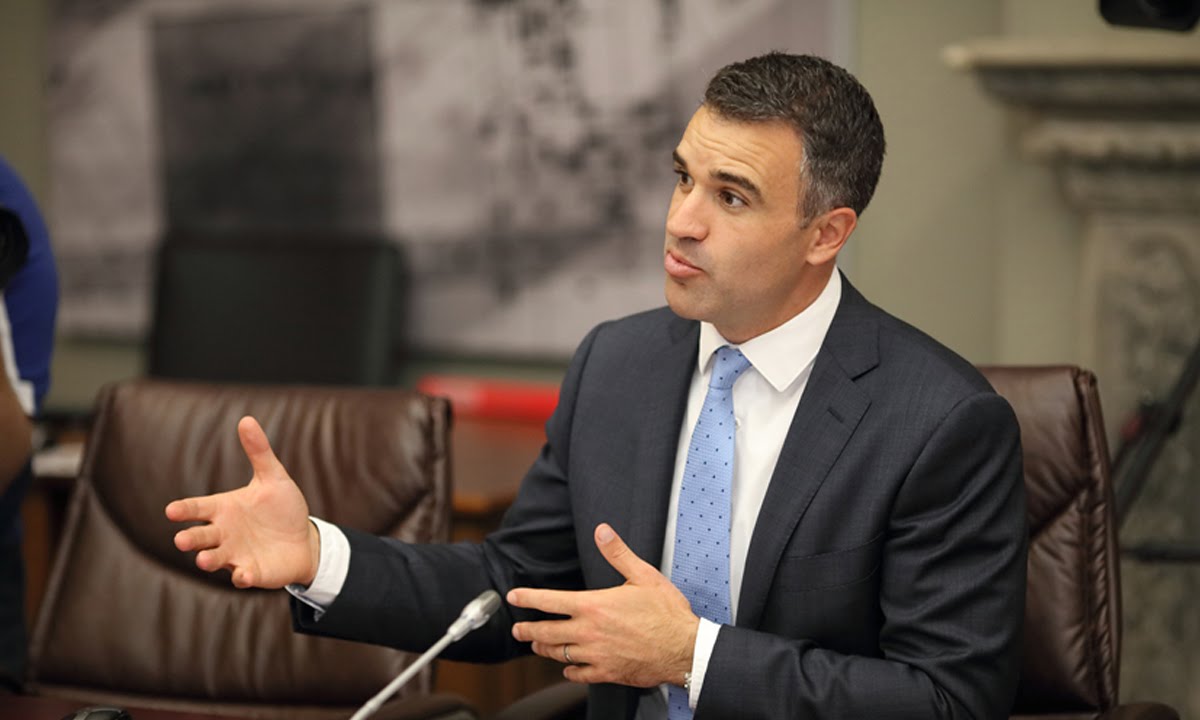
Malinauskas: didn’t join Labor for social issues. Photo: Tony Lewis / InDaily
Since Mike Rann became leader of an ALP shell-shocked by a State Bank-inspired election pummelling in 1994, plenty has changed for Labor. But there’s been very little change at the top of the party.
Malinauskas is only the second person to assume the leadership since Mike Rann’s ascension. And, appropriately perhaps, he played a pivotal role in removing the former Premier and installing Jay Weatherill in his place – an act of political ruthlessness most in the party consider pivotal to their unlikely 2014 victory.
It was Malinauskas – then the head of the influential shoppies’ union – who with fellow Right-winger Jack Snelling visited Rann to tell him his time was up.
One characteristic people are looking for more than anything else is authenticity
But for all that, Malinauskas evidently hasn’t spent much time ruminating on the strengths or weaknesses of the men who preceded him.
“I think everybody’s got a different style,” he says.
“I haven’t really spent much time comparing myself to Jay or Mike – that would feel a bit strange to do, that to be honest.”
Mainly because, he says, of all the advice he’s received from political mentors “there’s been one common theme, and I think it rings true for what’s going on in politics generally – you’ve just got to be yourself”.
“There are a number of things people are looking for in terms of policy, philosophy and ideology, but one characteristic people are looking for more than anything else is authenticity,” he reasons.
“That’s what’s got Turnbull into so much trouble – he doesn’t look authentic anymore because everything he believed in he now doesn’t.”
It’s the one quality he attributes for the electoral success of Donald Trump in the US – a leader for whom he clearly has little regard.
“One of the most sophisticated democracies in the world elected Donald Trump as president… what was the attribute they saw? I can’t see it myself, other than authenticity.”
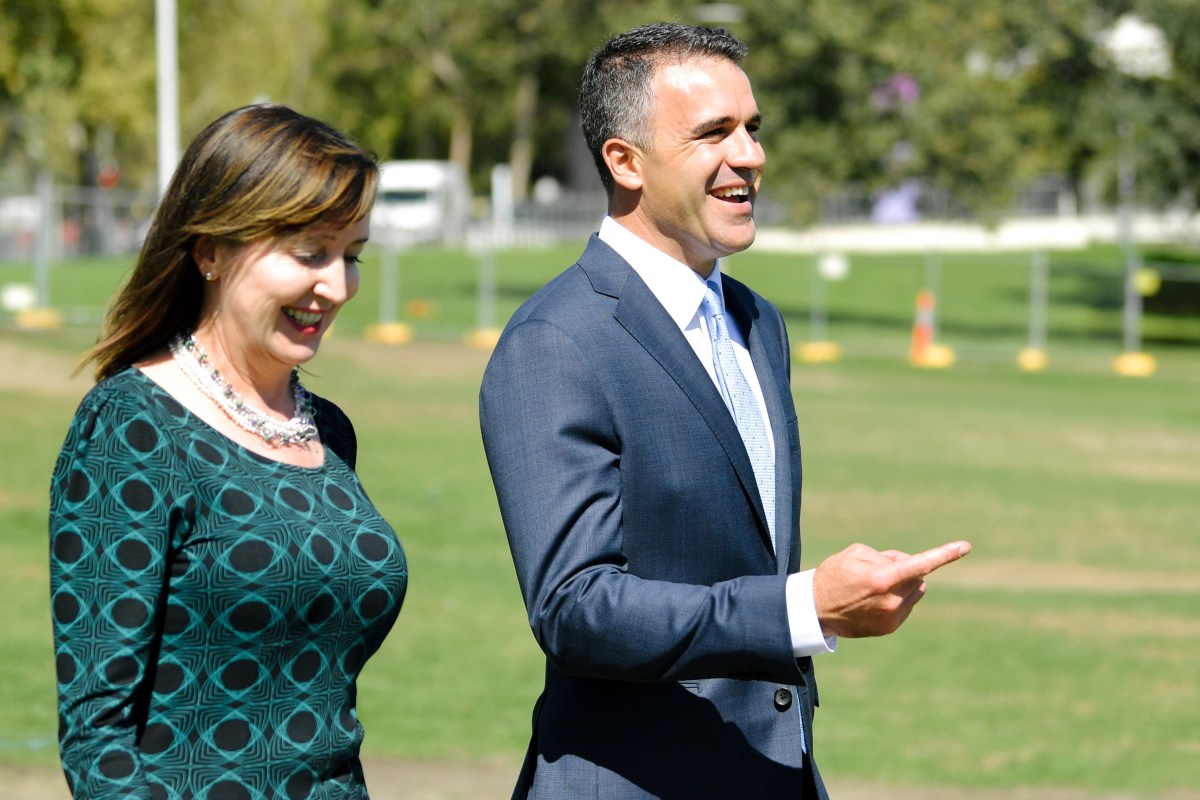
Malinauskas and his deputy Susan Close. Photo: Morgan Sette / AAP
Labor is in the initial throes of a ‘listening’ process – a community consultation that will draw a final curtain on the policy legacy of its 16 years in office and reset its agenda for Opposition.
Malinauskas has already declared himself wary of the obligatory carping style of Opposition, backing up his rhetoric with commitments to review Labor’s aversion to open ICAC hearings and embracing the Liberals’ election pledge of abolishing payroll tax for small businesses.
But he’s also given little ground on the shop trading debate – other than an olive branch on Sunday morning trade.
A cynic might suggest his compromises thus far appear to be on legislation that will pass the Upper House in any case, and that he’s dug in his heels on legislation Labor could muster crossbench support to block or amend.
But of course his shopping hours stance is hardly surprising, given his pedigree running the union that is leading the charge on opposing deregulation.
Of keen interest though is his stance on other policy matters likely to come under review – particularly those that were hallmarks of Labor’s term in office.
Malinauskas says he’s committed to the renewable agenda championed by both Rann and Weatherill.
“Let me tell you why – we have to have the maturity to not look at renewables policy just as an environmental policy,” he says.
“For me it’s an economic policy as much as anything – the numbers speak for themselves.”
According to the Labor leader, “what Tony Abbott and Co. have sought to do is try and turn the renewables debate into a manifestation of a broader ideological question about whether or not climate change is real”.
“I happen to believe that when you’re a policymaker you have to take advice of scientists,” he adds.
“But if you forget the environmental aspect, everybody can see [that] this is happening – you’re either ahead of the curve or you’re behind it.”
Where there are things that make sense and are in the interest of the electorate, why wouldn’t we agree with them? I don’t know whether that’s a wise political strategy or not…
Marshall this week flagged the prospect that the question of local nuclear power generation “could come back onto the agenda further down the track”.
Malinauskas says: “I think nuclear power on balance is not a bad thing… because I believe climate change is real.”
“Nuclear power is a source of baseload energy and zero carbon emissions – for me, that means it’s potentially a good thing,” he said.
“But nuclear power not coming to SA, because it’s not economic – the [Kevin Scarce] Royal Commission made that very clear.”
So a Peter Malinauskas-led Labor Party won’t be advocating for a local nuclear industry?
“No, because it’s not economic… why would I advocate for something that’s not economic?”
The Weatherill-led Labor made a big show of its push for city “vibrancy”, propelled by a riverbank infrastructure build, small bars and food trucks.
He’s diplomatic about the ‘vibrant city’ agenda – “what we’ve done in the city of Adelaide is undoubtedly a hallmark of Labor’s legacy and we should be proud of it” – but appears wary of dwelling on it.
“It was undoubtedly a good thing… everybody appreciates how crucial it was for our economy – but we shouldn’t work under the assumption that everybody gets to enjoy that lifestyle, and that’s something to be very conscious of,” he says.
One of the Rann-era benchmarks that was hastily abandoned by Weatherill was a target for population growth – something that appears unlikely to be revived under Malinauskas.
“I believe in a sustainable level of population growth, but I don’t think we should be having SA growing… in a way that undermines our standard of living,” he says, citing Sydney as a prime example of population growth run amok.
Millionaires aside, he notes, “there’s not a person who lives in Sydney that doesn’t come here and say we have an excellent standard of living”.
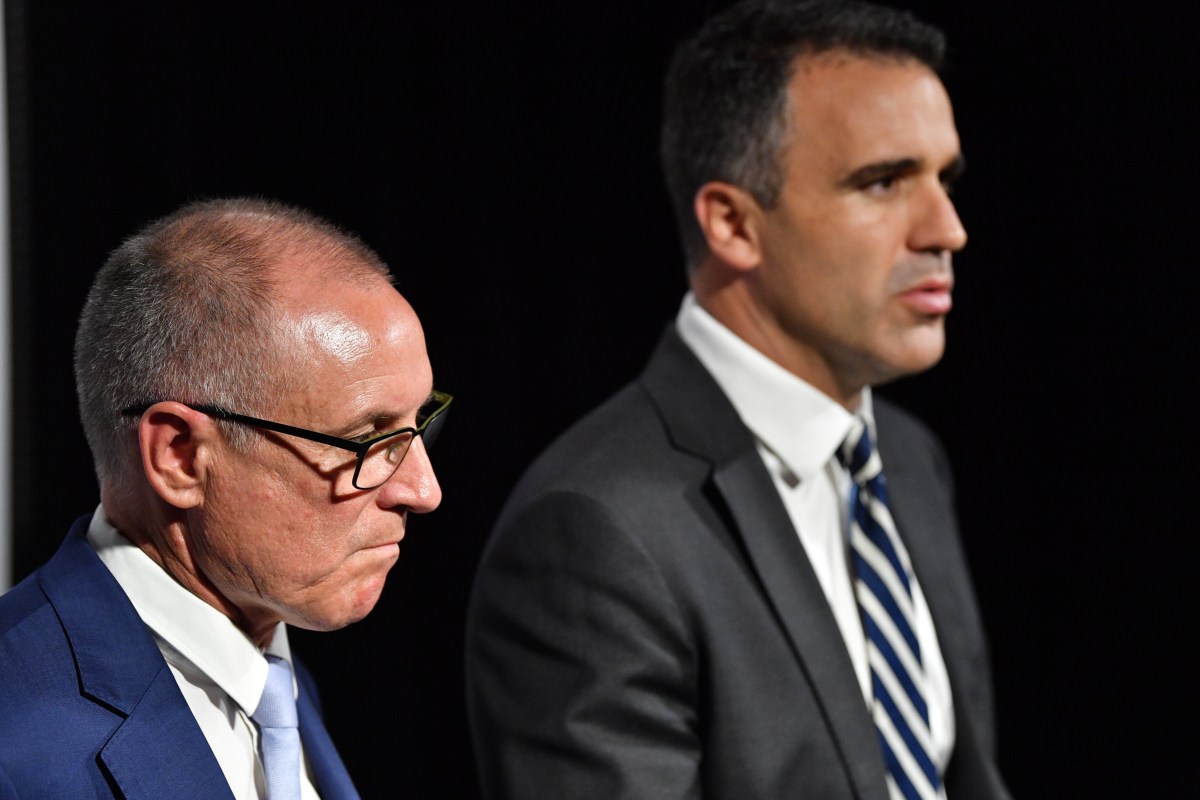
Former Premier Jay Weatherill with his successor Peter Malinauskas. Photo: David Mariuz / AAP
If Malinauskas’s rise seems swift, it has echoes of another predecessor – Steven Marshall. When the now-Premier took over as Opposition Leader in 2013 with the Liberals riding high in the polls, his transition to power appeared imminent. In the event, it took another five years to eventuate.
Perhaps it’s a precedent of which Malinauskas is conscious.
If Annastacia Palaszczuk can win that election, anything can happen…
“I think every election’s winnable,” he ponders.
“If Annastacia Palaszczuk can win that election [in Queensland after Campbell Newman’s landslide] anything can happen… but I do not think it’s going to be easy.”
The first-term lower house MP acknowledges “there are challenges about transitioning into opposition – just as there are for the Libs transitioning into government”.
“There are different ways you can do opposition – the orthodoxy is you get up and smash the government every opportunity you can get.”
But that’s not an orthodoxy to which Malinauskas subscribes. Indeed, he believes it might have cost the Liberals four years in office.
“I do actually think that’s what contributed to their loss in 2014 – opposing everything that people thought was good. I don’t know how that did them any favours,” he muses.
“I do intend to do it a bit different.”
That doesn’t mean “agreeing with them all the time – far from it”.
But “where there are things that make sense and are in the interest of the electorate, why wouldn’t we agree with it?”
“I don’t know whether that’s a wise political strategy or not,” he concedes.
“Time will tell.
“But the alternative is you do something that’s not consistent… that’s fake and inauthentic.
“I’d rather be myself and see how we go.”
Malinauskas has had plenty of time to learn from Labor warriors of the past.
“You speak to people who have left politics, and their regrets tend to be when they went against their instincts or haven’t been who they are,” he says.
He argues “operating the way I always have, and being myself” is the approach that he believes “gives us the best chance of winning”.
He pauses, reflecting on what he’s just said.
“Or, at least,” he adds, “that gives me the best chance of being the leader I want to be.”




